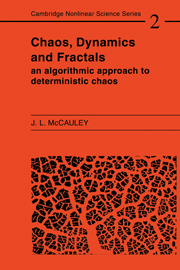Book contents
- Frontmatter
- Dedication
- Contents
- Preface
- Miscellaneous Frontmatter
- Introduction
- 1 Flows in phase space
- 2 Introduction to deterministic chaos
- 3 Conservative dynamical systems
- 4 Fractals and fragmentation in phase space
- 5 The way to chaos by instability of quasiperiodic orbits
- 6 The way to chaos by period doubling
- 7 Introduction to multifractals
- 8 Statistical mechanics on symbol sequences
- 9 Universal chaotic dynamics
- 10 Intermittence in fluid turbulence
- 11 From flows to automata: chaotic systems as completely deterministic machines
- Bibliography
- Index
11 - From flows to automata: chaotic systems as completely deterministic machines
Published online by Cambridge University Press: 05 October 2013
- Frontmatter
- Dedication
- Contents
- Preface
- Miscellaneous Frontmatter
- Introduction
- 1 Flows in phase space
- 2 Introduction to deterministic chaos
- 3 Conservative dynamical systems
- 4 Fractals and fragmentation in phase space
- 5 The way to chaos by instability of quasiperiodic orbits
- 6 The way to chaos by period doubling
- 7 Introduction to multifractals
- 8 Statistical mechanics on symbol sequences
- 9 Universal chaotic dynamics
- 10 Intermittence in fluid turbulence
- 11 From flows to automata: chaotic systems as completely deterministic machines
- Bibliography
- Index
Summary
The arithmetic of deterministic chaos
We began this book with the qualitative viewpoint: the formulation of nonlinear dynamics as flows in phase space and replaced the study of the flow by the study of an iterated map, namely a stroboscopic map, a Lorenz plot, or a Poincaré section. An invariant set of a map is the point set in the map's phase space that is left invariant under arbitrarily many iterations of the map – mathematically, it is the closure of the trajectory as the number of iterations goes to infinity. In other words, if you start iterating from an initial condition that belongs to the invariant set and imagine a gedanken computation where the arithmetic could be done exactly, then, as the time goes to infinity the map would never leave the invariant set. Infinite precision is impossible in arithmetic, as it is in experiment, so one main problem for us has been to understand systematically how to discover coarsegrained descriptions of invariant sets as well as different possible statistical distributions that can be generated by the dynamics on those coarsegrained sets by doing finite-precision arithmetic for finitely many iterations of a map. For that reason, we arrived at the algorithmic method that was used throughout the text. It is the aim of this chapter to explain why the algorithmic, or finite-precision, approach to chaos theory is not lacking in depth and is, from a certain standpoint, fundamental.
Information
- Type
- Chapter
- Information
- Chaos, Dynamics, and FractalsAn Algorithmic Approach to Deterministic Chaos, pp. 278 - 308Publisher: Cambridge University PressPrint publication year: 1993
